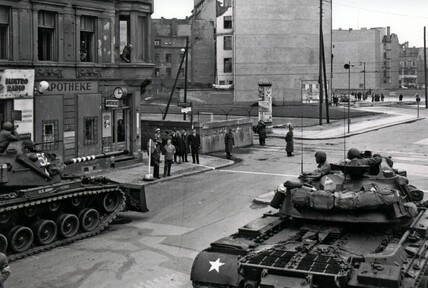On the other Germany – Katja Hoyer in TLS:
‘In Beyond the Wall, Hoyer, who was born in the GDR, sets out to fill in these blanks. She aims to show that real people lived real lives in a Germany that for forty years was utterly distinct from its neighbour to the west – and that this other Germany offered “opportunity and belonging as well as oppression and brutality”. This is important territory, since those forty years shaped the mentalities of those who lived there and remain vital for understanding Germany today.’
(…)
‘The most gripping parts of Hoyer’s narrative are those that follow the German communists who fled to Moscow under the shadow of fascism. Here they fell victim to the increasing paranoia of the Soviet leadership, to the ruthless pragmatism, betrayals, suspicion and arbitrary executions. Only a quarter of those Germans who went to Moscow survived Stalin’s purges. And, as Hoyer shows, the personalities of those who did return were forged by this experience.
The East Germany that emerged was, the author argues, unique – “the only country in the Eastern bloc whose existence was never ensured”. Its leaders had to defend their country not only against the West, but also against the Soviet Union. Even Stalin held out for a neutral, demilitarised but unified Germany at the centre of Europe. What’s more, the GDR was disadvantaged economically. Its territories were far from the industrial heartlands and natural resources of the Ruhr; it also laboured under crippling financial reparations to the Soviet Union, while WestGermany benefited from the American Marshall Plan and the economic miracle of the 1950s. From the beginning, in other words, East Germany was locked in competition with its neighbour. Young, ambitious and skilled workers could leave for a country where they spoke the same language and had common roots, even family. And they did: by 1961, when the Berlin Wall was erected, the GDR had already lost 1.3 million people. That precarity became the driving force not only of East Germany’s ambitions, but of its often disastrous political and social rigidity.’
(…)
‘Even those who compromised outwardly with the system often withdrew into a private realm away from the regulated social sphere, creating a so-called Nischengesellschaft (niche society). People learnt to live a kind of everyday double life, guarding their real thoughts and opinions until they believed themselves safe. But this was also the moment when the secret police consolidated their hold on that private sphere through a huge network of unofficial informants, many of whom systematically undermined those closest to them. Largely missing from this volume are the accounts of those who could never attend university because of some minor misdemeanour at school; whose lives were blighted on account of their homosexuality (taboo almost to the end); who were imprisoned for writing critical poems, even though they were never published; or who were driven to breakdown, even suicide, by the Stasi’s deliberate programme of psychological harassment (Zersetzung – literally, dissolution). And one hears nothing from the older generations who lived through, and felt betrayed by, two German dictatorships.’
(…)
‘In 2009 an absolute majority of East Germans still thought life had been better under socialism.
Now, more than thirty years on, much of this has changed. Memories of the East seem to belong to another age, like the faded GDR colour stock and the antiquated pushchairs in the photos reprinted here. Or they have been commodified in the Trabi tours, “Ostel” design hotels and GDR museums that tout an authentic experience of genuine East German artefacts. New generations have come to adulthood with the GDR only as an inherited memory. And as Germany becomes ever more multicultural, that memory is diluted further. Crucially, though, one still sees the imprint of division in voting patterns, employment statistics and age distribution in the largely emptied former East German states – or, in a different spirit, in the demonstrations against the invasion of Ukraine, by people who remember what Russian control really looks like. All of which makes Beyond the Wall timely. Despite its curious blanks, Katja Hoyer’s book does much to combat amnesia and Cold War prejudice, and to normalize the GDR and the people who lived there.’
Read the article here.
The word ‘normalize in the last sentence is a bit odd, but alas.
The euphoria of the Wiedervereinigung was short-lived. At that time though a huge majority wanted to join the capitalists in West-Germany.
Some Germans nowadays want to get rid of democracy altogether, without any sense of longing for socialism.
Political nostalgia a powerful tool. A paradise in the past is a safer bet than a paradise in the future.
